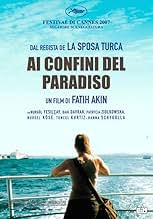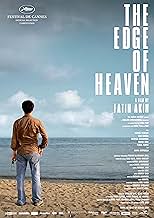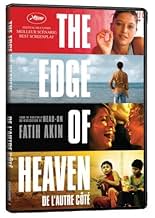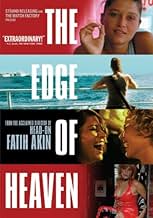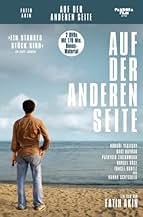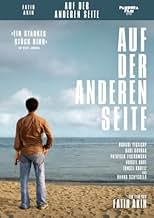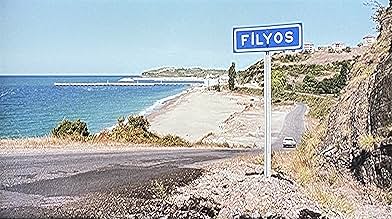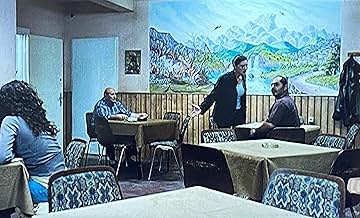IMDb-BEWERTUNG
7,7/10
34.908
IHRE BEWERTUNG
Ein Türke reist nach Istanbul, um die Tochter der Exfreundin seines Vaters zu finden.Ein Türke reist nach Istanbul, um die Tochter der Exfreundin seines Vaters zu finden.Ein Türke reist nach Istanbul, um die Tochter der Exfreundin seines Vaters zu finden.
- Auszeichnungen
- 37 Gewinne & 22 Nominierungen insgesamt
Empfohlene Bewertungen
I usually comment on films right after I've seen them. However, "Auf der anderen Seite" (The Edge of Heaven), touched me in a way that few films do, so a month has passed.
This story of two sets of mothers and daughters, a father and his son...and a gun seems familiar, but its resolution is anything but. To lay out the plot would be daunting. So much ground is covered, yet it unfolds effortlessly. F a t i h Akin's screenplay is elliptical--the story starts where it finishes--but by the end, when the opening scene is replayed, our journey with these characters puts us, indeed, on the edge of transcendence.
Amid the desperation on display, small details brim over the images: a son waters his father's tomato plants pausing to taste the ripened fruit, a mother pits cherries that stain her fingers, another manicures her nails to avoid a quarrel, we imagine a bookstore's--specifically a German language bookstore in Istanbul--smell and the safety it can bring to a foreigner.... These domestic details are set against much larger, although finally insignificant, struggles: the cultural divide of immigrants, students revolting against an oppressive government, how imprisonment can deaden the soul. But F a t i h Akin wants the basic struggles of family bonds to be central here. It's the resolution of family rifts--small and large, emotional and physical--that are urgent.
The choice of settings, music, lighting... all carefully selected to build toward one moment that catches us off guard. When a foreigner asks "What is Kurban Bayrami?" (a Turkish holiday) the many seemingly disparate elements that we've been watching--in good faith because they're so rivetingly told--suddenly come together, it almost knocked the breath out of me.
Whether or not we as viewers have lost a father or mother or a child, through death, physical separation or emotional turmoil, we can understand what these characters suffer. And how all that can be healedthe willingness to have faith that good intentions can mend this troubled worldis something like a miracle to find illustrated on film. The weapons these characters lay down to pursue goodness don't necessarily have the effect they intend, but as we watch lives torn apart and then healed we see what they don't. And we carry that lesson out of theater with us.
This story of two sets of mothers and daughters, a father and his son...and a gun seems familiar, but its resolution is anything but. To lay out the plot would be daunting. So much ground is covered, yet it unfolds effortlessly. F a t i h Akin's screenplay is elliptical--the story starts where it finishes--but by the end, when the opening scene is replayed, our journey with these characters puts us, indeed, on the edge of transcendence.
Amid the desperation on display, small details brim over the images: a son waters his father's tomato plants pausing to taste the ripened fruit, a mother pits cherries that stain her fingers, another manicures her nails to avoid a quarrel, we imagine a bookstore's--specifically a German language bookstore in Istanbul--smell and the safety it can bring to a foreigner.... These domestic details are set against much larger, although finally insignificant, struggles: the cultural divide of immigrants, students revolting against an oppressive government, how imprisonment can deaden the soul. But F a t i h Akin wants the basic struggles of family bonds to be central here. It's the resolution of family rifts--small and large, emotional and physical--that are urgent.
The choice of settings, music, lighting... all carefully selected to build toward one moment that catches us off guard. When a foreigner asks "What is Kurban Bayrami?" (a Turkish holiday) the many seemingly disparate elements that we've been watching--in good faith because they're so rivetingly told--suddenly come together, it almost knocked the breath out of me.
Whether or not we as viewers have lost a father or mother or a child, through death, physical separation or emotional turmoil, we can understand what these characters suffer. And how all that can be healedthe willingness to have faith that good intentions can mend this troubled worldis something like a miracle to find illustrated on film. The weapons these characters lay down to pursue goodness don't necessarily have the effect they intend, but as we watch lives torn apart and then healed we see what they don't. And we carry that lesson out of theater with us.
Faith Akin, renowned for his energetic movie 'Gegen die Wand', brings another story about the Turkish-German community. The movie focuses on three families who are all connected in some way. In a beautiful way Akin shows the struggle of a Turkish prostitute, a professor of German literature, a young Turkish rebel, a student English and Spanish and a retired widower to find peace and happiness in their lives. Akin manages to avoid the many pitfalls which can lead to clichés. The characters remain just ordinary people with genuine emotions and problems. The movie also depicts the impact of globalization and multiculturalism in nowadays Germany and Turkey. It's the most debated topic of our time. To what extent do we want newcomers to adapt to their new surroundings and to what extent do we accept them to cherish their own cultural heritage. In an even broader perspective, it deals with the clash between the Islamic and western world. 'Auf der anderen Seite', which means on the other side, shows how Turkish immigrants come to love their new country, Germany, without losing their Turkish roots. I think Akin invites us to try and imagine the backgrounds of people, so there will be less misunderstanding. This view is symbolized by Lotte, a German student, who decides to help Ayten, a Turkish political activist who fled Turkey. She doesn't know the Turkish girl but just wants to help her, because the girl has nowhere to go. This quest even brings her to the shores of Istanbul, a city where East meets West in the most literal way.
In the end, 'Auf der anderen Seite' is a story of love and hope which is most endearing and sheds a refreshing light on the global trend of clashing cultures. Any one who is interested in these topics and just loves a very well made movie, ought see this German-Turkish production!
In the end, 'Auf der anderen Seite' is a story of love and hope which is most endearing and sheds a refreshing light on the global trend of clashing cultures. Any one who is interested in these topics and just loves a very well made movie, ought see this German-Turkish production!
With a small scale ensemble cast, The Edge of Heaven examines several themes through the lives of the many characters. Nejat Aksu (Baki Davrak) is a professor of literature in a German university and not happy about his father Ali's new live-in partner Yeter (Nursel Köse), a prostitute who Ali (Tuncel Kurtiz) has hired to stay with him. Yeter has an estranged daughter Ayten (Nurgül Yesilçay) who Nejat decides to track down in Turkey after a tragedy occurs in the family. However, unbeknownst to Yeter and Nejat, Ayten has already traveled to Germany to look for her mother and seek a refugee status as she is a member of a rebellious activist group in Turkey. In Germany she meets a female student Charlotte (Patrycia Ziolkowska) who offers her a place to stay and eventually follows her back to Turkey, much to her mother Susanne's (Hanna Schygulla) chagrin.
The two main story lines (those of Nejat / Yeter and Ayten / Charlotte) are presented after each other in a clear manner but the stories intertwine in many ways, often unnoticed by the characters, creating an extra feel of tragedy – the answer would be so close if only they knew each other! Besides the smaller instances of bad luck, the deaths of major characters are what end up driving the plot forwards, but in the end the message is hopeful; an understanding is what everybody is ultimately seeking.
Akin's calm direction and the good performances throughout easily raise The Edge of Heaven among the best Turkish films I've seen (even though I have only seen a handful). The themes of finding one's true calling in life, the forgiving nature of parent–child relationships and the subpar human rights situation in Turkey are all explored without haste, always maintaining the balance between the different aspects of the story. For anyone who hasn't seen many Turkish films, The Edge of Heaven could be a good starting place, but I imagine it is also worth seeing for those more familiar with the country's cinema.
The two main story lines (those of Nejat / Yeter and Ayten / Charlotte) are presented after each other in a clear manner but the stories intertwine in many ways, often unnoticed by the characters, creating an extra feel of tragedy – the answer would be so close if only they knew each other! Besides the smaller instances of bad luck, the deaths of major characters are what end up driving the plot forwards, but in the end the message is hopeful; an understanding is what everybody is ultimately seeking.
Akin's calm direction and the good performances throughout easily raise The Edge of Heaven among the best Turkish films I've seen (even though I have only seen a handful). The themes of finding one's true calling in life, the forgiving nature of parent–child relationships and the subpar human rights situation in Turkey are all explored without haste, always maintaining the balance between the different aspects of the story. For anyone who hasn't seen many Turkish films, The Edge of Heaven could be a good starting place, but I imagine it is also worth seeing for those more familiar with the country's cinema.
So many films tell bland stories based on clichéd characters, whose ultimate destiny is established in the first tracking shot. But this intelligent film is based on a set of interesting individuals whose evolving personal histories quietly command attention. There's an elderly Turkish man, living in Germany, capable of both gentlemanly and violent behaviour; his son, successful but shy and unconnected to those around him; the prostitute he takes as a substitute for a wife; her politically radical daughter; the German student that the daughter falls for; and the student's mother, a conservative hausfrau with a less conservative past. Their lives intersect, but messily, not neatly, and director Faith Akin chooses to end his film before being forced to a near resolution. The film doesn't exactly make you sit on the edge of your seat; but it feels both true to life and utterly personal. It's a thoughtful movie in the best sense of that word.
In his film The Edge of Heaven (2007), under original title Auf der anderen Seite (On the Other Side), Fatih Akin, a German writer-director of Turkish parentage, intertwines two stories, whose protagonists get caught in seemingly hopeless situations, both resulting in individual tragedies, stories with a cross section on the character of a young Turkish German professor, Nejat Aksu (Baki Davrak) whom we first meet living in Bremen and lecturing in the German literature university classes, who returns to Turkey, on a (futile?) quest for the lost daughter of his father's suddenly deceased girlfriend, and (unexpectedly?) stays there where he, quite appropriately to his vocation and interests, buys and maintains an Istanbul bookstore with exclusively German books (or books translated in to German) on offer, two stories which gradually approximate each other, but never actually "resolve" one in to another. Still, the end is open, with the possibility for resolution, future cleansing what-so-ever, of the souls heavily burdened with guilt from the past.
Film touches real life situations, ranging from usual family tensions and quarrels, through losses suffered due to physical separation or emotional disorder, all the way to ultimate loss, death of the dear one, and in doing so engages audiences on the first-person level, because nobody is spared from at least a single such experience, or two or more. Such an easy and deep identification with on-screen happenings, with how they develop, how they are mended or not... is what we feel all along, and what we carry out of the theatre when the film is over... Split between two sides, Life and Death on the edge, but who's to tell which side is the Heaven and which one is the Hell?
Heavy matters tackled, yet easy to relate to, feel for affected characters and empathize with them, in an emotionally charged and very engaging film.
Film touches real life situations, ranging from usual family tensions and quarrels, through losses suffered due to physical separation or emotional disorder, all the way to ultimate loss, death of the dear one, and in doing so engages audiences on the first-person level, because nobody is spared from at least a single such experience, or two or more. Such an easy and deep identification with on-screen happenings, with how they develop, how they are mended or not... is what we feel all along, and what we carry out of the theatre when the film is over... Split between two sides, Life and Death on the edge, but who's to tell which side is the Heaven and which one is the Hell?
Heavy matters tackled, yet easy to relate to, feel for affected characters and empathize with them, in an emotionally charged and very engaging film.
Wusstest du schon
- WissenswertesNurgül Yesilçay - who is a big star in her native Turkey - had doubts about taking on the part of Ayten as she wasn't sure how audiences would react to seeing her as a revolutionary lesbian.
- PatzerIn the film, the year is 2006 and it is the Festival of Sacrifices (Kurban Bayrami), a religious holiday. Everybody is in summer clothes and many of them are sweating. The Festival of Sacrifices in 2006 in Turkey was in winter, at the end of December.
- Zitate
story: After telling the story of Abraham that was willing to sacrifice his son, Ismael, to show God his obedience. Before Abraham could slay his son God sent a lamb to sacrifice instead.
Nejat Aksu: I asked my dad if he would have sacrificed me as well.
Susanne Staub: And what did he say?
Nejat Aksu: That he would even make an enemy of God to protect me.
- Crazy CreditsThe film's title appears twice: in the middle of the film at 1 hour 25 mins and after the end credits.
- VerbindungenFeatured in Fatih Akin - Tagebuch eines Filmreisenden (2007)
Top-Auswahl
Melde dich zum Bewerten an und greife auf die Watchlist für personalisierte Empfehlungen zu.
- How long is The Edge of Heaven?Powered by Alexa
Details
- Erscheinungsdatum
- Herkunftsländer
- Offizielle Standorte
- Sprachen
- Auch bekannt als
- The Edge of Heaven
- Drehorte
- Produktionsfirmen
- Weitere beteiligte Unternehmen bei IMDbPro anzeigen
Box Office
- Bruttoertrag in den USA und Kanada
- 742.349 $
- Eröffnungswochenende in den USA und in Kanada
- 14.257 $
- 25. Mai 2008
- Weltweiter Bruttoertrag
- 17.804.565 $
- Laufzeit
- 1 Std. 56 Min.(116 min)
- Farbe
- Sound-Mix
- Seitenverhältnis
- 1.85 : 1
Zu dieser Seite beitragen
Bearbeitung vorschlagen oder fehlenden Inhalt hinzufügen


